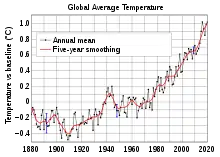دیدگاه علمی در خصوص تغییرات اقلیمی
دیدگاه علمی در خصوص تغییرات اقلیمی عقیدهٔ کلی بین دانشمندان در این خصوص است که آیا گرمایش جهانی در حال رخ دادن است، و (اگر چنین است) و علل و عواقب احتمالی آن چیست. این نظر علمی در ریویوهای سیستماتیک، از سوی نهادهای علمی ملی یا بینالمللی و ارزیابیهای نظرات بین دانشمندان اقلیمی ابراز شده است. برخی دانشمندان، دانشگاهها و آزمایشگاهها از طریق انتشارات دارای داوری همتا در نظر کلی علمی مشارکت کرده و نقاط اتفاق نظر و قطعیت نسبی در آن گزارشها و ارزیابیها خلاصه شده است.[1]

اجماع علمی این است که اقلیم زمین بی شک در حال گرم شدن است و این شدیداً محتمل است (یعنی با احتمال اقلاً ۹۵٪ یا بیشتر) که انسانها بیشتر آن را از طریق اقداماتی که تمرکز گاز گلخانهای را در جو زمین، با اقداماتی چون جنگلزدایی و سوزاندن سوخت سنگوارهای انجام میدهند. علاوه بر این محتمل است که برخی گرم شدنهای ناشی از گازهای گلخانهای با افزایش هواپخشها جبران شده باشد.[2][3][4][5]
جستارهای وابسته
منابع
- Oreskes, Naomi (2007). "The Scientific Consensus on Climate Change: How Do We Know We're Not Wrong?". In DiMento, Joseph F. C.; Doughman, Pamela M. Climate Change: What It Means for Us, Our Children, and Our Grandchildren. MIT Press. pp. 65–66. ISBN 978-0-262-54193-0.
- "Warming of the climate system is unequivocal, as is now evident from observations of increases in global average air and ocean temperatures, widespread melting of snow and ice and rising global average sea level." IPCC, Synthesis Report, Section 1.1: Observations of climate change, in IPCC AR4 SYR 2007.
- IPCC, "Summary for Policymakers", Detection and Attribution of Climate Change,
«It is extremely likely that human influence has been the dominant cause of the observed warming since the mid-20th century» (page 15) and «In this Summary for Policymakers, the following terms have been used to indicate the assessed likelihood of an outcome or a result: (...) extremely likely: 95–100%» (page 2).
, in IPCC AR5 WG1 2013. - IPCC, Synthesis Report, Section 2.4: Attribution of climate change, in IPCC AR4 SYR 2007."It is likely that increases in GHG concentrations alone would have caused more warming than observed because volcanic and anthropogenic aerosols have offset some warming that would otherwise have taken place."
- [Notes-SciPanel] America's Climate Choices: Panel on Advancing the Science of Climate Change; National Research Council (2010). Advancing the Science of Climate Change. Washington, D.C.: The National Academies Press. ISBN 0-309-14588-0.
(p1) ... there is a strong, credible body of evidence, based on multiple lines of research, documenting that climate is changing and that these changes are in large part caused by human activities. While much remains to be learned, the core phenomenon, scientific questions, and hypotheses have been examined thoroughly and have stood firm in the face of serious scientific debate and careful evaluation of alternative explanations. * * * (p21-22) Some scientific conclusions or theories have been so thoroughly examined and tested, and supported by so many independent observations and results, that their likelihood of subsequently being found to be wrong is vanishingly small. Such conclusions and theories are then regarded as settled facts. This is the case for the conclusions that the Earth system is warming and that much of this warming is very likely due to human activities.
- مشارکتکنندگان ویکیپدیا. «Scientific opinion on climate change». در دانشنامهٔ ویکیپدیای انگلیسی، بازبینیشده در ۲۷ دسامبر ۲۰۱۵.